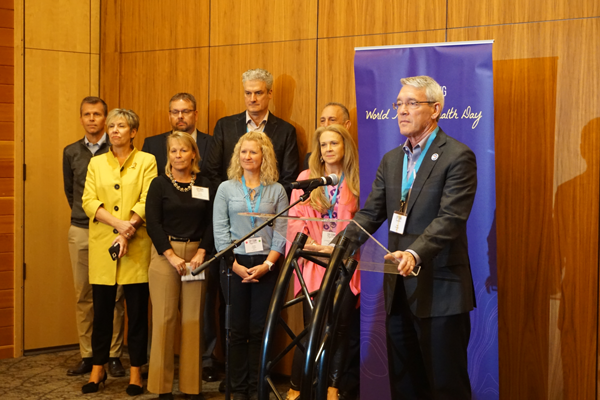
World Mental Health Day kicked off a two-day Design Summit where more than 175 mental health experts and leaders gathered to launch a national movement to end the stigma around mental health and substance use disorders. The Summit was the largest collaboration of its kind and brought together national organizations, including federal agencies, NGOs, and higher education institutions that committed time, resources and expertise to develop long-term solutions to ending stigma.
“Our goal was to bring together the brightest minds and most passionate experts from various communities to create a path forward to stop the stigma around mental health and substance use disorders,” said Mark H. Rapaport, MD, CEO of Huntsman Mental Health Institute (HMHI). “Now is the time to launch a sustained national movement to stop the ignorance and prejudice around these illnesses. If we do not, patients will suffer needlessly because they are not seeking the care they need.”
The urgency to end suffering and save lives fueled the launch of this national movement that will require a broad coalition of public- and private-sector partners working with thought leaders and activists over multiple decades. Huntsman Mental Health Institute acts as a “backbone” with the intent to facilitate collaboration and coordinate activities and nationwide efforts to eliminate stigma for good.
Every year, 1 in 5 people has a diagnosable mental health disorder – nearly two times more than those diagnosed with diabetes. Substance use disorder affects more than 20 million Americans aged 12 and older, and almost half of all adults will experience some mental health disorder in their lifetime. Mental health disorders are preventable, treatable and often curable, yet many people do not seek care because of stigma.
“Our organizations have been in the trenches together through this mental health crisis,” said Jared Skillings, Ph.D., American Psychological Association. “Through the pandemic, we have seen small improvements in stigma – political leaders are taking some action, and celebrities are talking openly about their mental health struggles – but stigma still impacts every family and every community in a very personal way. We will not see progress until we view and treat mental health as part of our overall health and wellness. There is hard work to be done over the next decade to create parity between mental and physical health. This can only happen if we are also successful at ending stigma.”
At the Design Summit, leaders shared their experiences and their organization’s expertise and laid out goals to grow the national movement and eliminate stigma from all sectors of society. Participants joined groups designed to address specific aspects of stigma where a concerted effort is needed, including a focus on underrepresented and rural communities, anti-stigma efforts that impact the workforce, and a focus on children, teens, and young adults and their families.
"One in 3 young adults will experience a mental illness each year, and while symptoms often appear by age 14, an accurate diagnosis doesn’t typically occur for eight to 10 years, and still half of all young people struggling with their mental health will not get any care,” said John MacPhee, CEO, The Jed Foundation. “We look forward to working together so that every college and university – and all schools – have a comprehensive approach and plan to support student mental health, enabling each student to know where and how to seek help. This will only happen if we, as a society, can drop the stigma surrounding mental health."
Leaders also worked to implement plans that authentically acknowledge and address the unique ways stigma impacts Black, Indigenous, and people of color. The Design Summit engaged experts representing different cultures and communities who discussed barriers that effectively prevent populations of people from receiving help for mental health and substance use disorders. The Summit concluded with a plan to collaborate on future events aimed at media and journalism, children and families, and rural mental health.
“If we had a world where it is OK to get the help you need, people would be more productive and happier. We would also have a world where many hidden costs would go away,” Rapaport said. “All we need to do is begin to help people realize that it is OK to have diseases that affect how we feel or think and proceed. Treatments are available to help people, and lives can be much richer.”
A complete list of participants can be found here. For more information about the Design Summit, visit stopstigmatogether.org.
About Huntsman Mental Health Institute at the University of Utah
HMHI is a university-wide institute designed to be a convener, collaborator, and problem solver. HMHI brings together the best of all fields to develop innovative solutions related to substance use and addiction, suicide prevention, depression, stigma, and other challenges. HMHI has a reputation throughout the Mountain West as a leader in advanced psychiatric treatment and care, serving a diverse population from young children to geriatric patients. Researchers at HMHI develop and apply the most advanced methods in brain imaging, genetics, epidemiology, and big data analysis and translates research into new treatments that help patients maintain a better quality of life. HMHI is also a regional training center for psychiatry and other mental health disciplines.
Media Contact
Jerilyn Stowe, Huntsman Mental Health Institute
jerilyn.stowe@hsc.utah.edu
801-243-5764